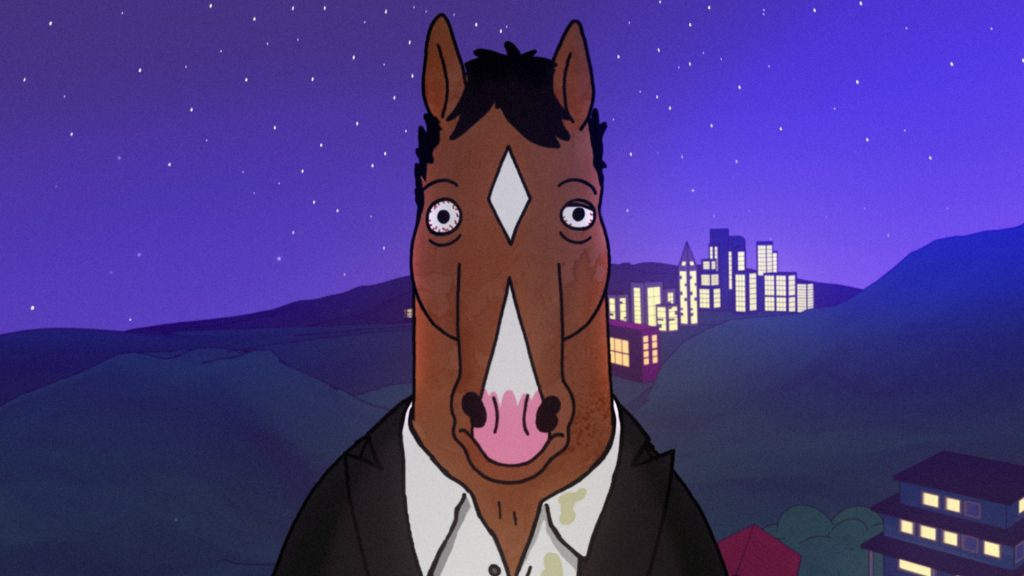By Mike O’Brien
Reservoir Dogs put Tarantino on the map for good reason: a movie whose runtime consists almost entirely of suited men arguing in a warehouse is hardly riveting. Nevertheless, its seemingly meandering banter and gripping tension are so rich with subtext that every element of the scene holds immense gravitas. BoJack Horseman, thofugh directly incomparable, is a similar achievement. Raphael Bob-Waksberg’s goofy show about the titular BoJack, an anthropomorphic horse suffering from depression and alcoholism, should not work on so many levels. It’s crammed with dreadful puns, comically absurd B-plots that somehow coalesce meaningfully with the main narrative, and on-the-nose commentary that, anywhere else, would have been too blunt and too preachy. Yet, somehow, this silly horse show delivers the most emotionally intelligent and thoughtful depiction of mental illness in the history of television. It’s that special brand of undeniable, unimitatable, and uncompromising triumph of character development and social commentary that only comes about once a generation.
If your experience with BoJack Horseman is limited to a brief flirtation with its inaugural episodes, you might think, quite reasonably, that I’m off my rocker. Its pilot episode is passably amusing, and a fine enough of contextualisation of BoJack and the Hollywood he lives in. It’s witty and stylistically unique, but BoJack’s early overreliance on MacFarlane-esque cutaway flashback jokes struggles to distinguish the show in the now-saturated genre of adult animation. Even the main cast thought they were in for the light-hearted irreverence of Family Guy when they signed up. But its derivative beginnings were a deliberately disarming masterstroke from Bob-Waksberg; as the show develops, it peels back the layers of its wacky caricatures to reveal the venom and humanity behind Hollywood’s eccentricities.
Our protagonist is BoJack Horseman, a cynical drunkard and Hollywood has-been riding his own coattails as the former star of Horsin’ Around, an unremarkable 90s sitcom. Living off royalties and residuals, BoJack spends his days lonelily lounging around his Hollywood Hills mansion watching reruns of his old show, relentlessly defending its absent qualities to his layabout housemate, Todd. Despite his narcissism and alcoholism, BoJack’s commentary on his superficial environment and contemporaries is refreshingly sober. For all Horseman’s personal flaws, of which he is comically defensive, we are seduced by his silver-tongued derision. But when he’s roped into letting an aggressively principled ghostwriter, Diane, follow him around to write his memoir, she exposes just how toxic and destructive BoJack is. Diane’s refusal to turn a blind eye and write a carelessly amorous account isn’t just an indictment of Horseman; it’s an expos├® of our complicity and sympathy for a terrible man merely because we’re experiencing his vulnerable point of view.

It’s a testament to how multifaceted and developed BoJack Horseman‘s main roster is that, as with real people, condensing them for review feels like an injustice to their complexity. For all BoJack Horseman‘s charted territory, which covers everything from suicidal regret to shameless criticisms of media ownership and corporate expansionism, one theme unites it all: nothing is that simple. Horseman is a misogynist, a narcissist, a habitual abuser with a victim complex, the ultimate poster boy of Hollywood’s untouchable elite. This animosity and entitlement, argues the show, doesn’t come from nowhere. Hollywood is a fickle machine of sycophants and flashing lights, a network of jaded suits that grooms the young and na├»ve with the promise of utopia under one condition: never stop dancing. Absolutely no feeling, action, or consequence in BoJack Horseman feels unearned or unjustified, and the exhaustive effort to enforce this is never tiresome or hackneyed. Horseman is a conduit of Hollywood’s corrosive, faceless wrath, but his failures are enabled by intergenerational family trauma, which the show fully explores. Not even those around him are safe from Bob-Waksberg’s interrogation of needs and vulnerabilities. Diane, who is superficially an antagonistic voice of reason, is a woman whose obsessive moral standards toxifies her relationship with others. Spiralling into depressive hypocrisy when she fails to adhere to them herself, it becomes clear that oftentimes, the uncompromising voices of reason around us are projecting their own failures of principle.
BoJack Horseman is a rare kind of nihilism. Shows like Rick and Morty explore nihilism as the innate worthlessness of the universe insofar as ÔÇÿmeaning’ as a social construct, but it lacks a sophisticated moral. At worst, Rick Sanchez is an invincible demigod whose nihilistic depression is fetishized by the writers and its audience. BoJack Horseman shares the theme, but has a clear and productive message. Horseman’s neglectful upbringing, his obsession with his sitcom, and the insularity of his Hollywood home has left him blind to a difficult truth: life is not a TV show. Equilibrium and closure are fictions. BoJack Horseman doesn’t believe in deep-downs and true selves; all you are is the sum of your actions. If anything, BoJack Horseman is about the journey of nihilism from a depressive pit to an empowering force. If life is merely a chaotic web of consequences, willpower and accountability are the only tools to navigate it.
Somewhere in BoJack Horseman‘s frenetic mixture of character analysis and endearingly silly mayhem is a show that, despite its animal-centric cast, is fascinatingly human. BoJack Horseman is just as much a TV show as it is a precious resource of emotional intelligence. When others express their difficulties with mental health, or find themselves beleaguered by emotional suffering and destructive behaviours, this is the first thing I recommend after therapy. If you’ve avoided BoJack Horseman under the assumption that it’s a silly cartoon that you don’t have time for, or because it initially seemed like American Dad but with a horse, I insist that you reengage it with the dignity it deserves. This is the best show of its decade.


